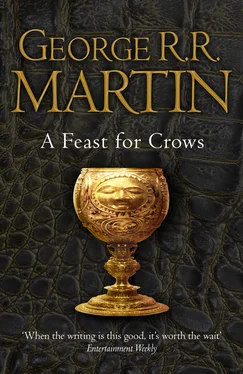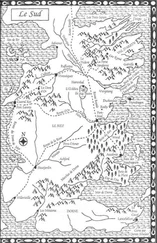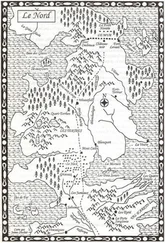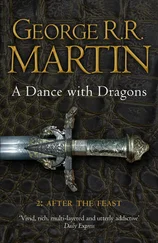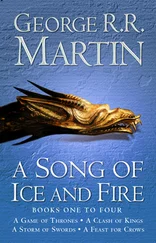If it was Ser Shadrich dogging her heels, she might well have a fight on her hands. She did not intend to partner with the man or let him follow her to Sansa. He had the sort of easy arrogance that comes with skill at arms, she thought, but he was small. I’ll have the reach on him, and I should be stronger too.
Brienne was as strong as most knights, and her old master-at-arms used to say that she was quicker than any woman her size had any right to be. The gods had given her stamina too, which Ser Goodwin deemed a noble gift. Fighting with sword and shield was a wearisome business, and victory oft went to the man with most endurance. Ser Goodwin had taught her to fight cautiously, to conserve her strength while letting her foes spend theirs in furious attacks. “Men will always underestimate you,” he said, “and their pride will make them want to vanquish you quickly, lest it be said that a woman tried them sorely.” She had learned the truth of that once she went into the world. Even Jaime Lannister had come at her that way, in the woods by Maidenpool. If the gods were good, the Mad Mouse would make the same mistake. He may be a seasoned knight, she thought, but he is no Jaime Lannister. She slid her sword out of its scabbard.
But it was not Ser Shadrich’s chestnut courser that drew up where the road forked, but a broken-down old piebald rounsey with a skinny boy upon his back. When Brienne saw the horse she drew back in confusion. Only some boy, she thought, until she glimpsed the face beneath his hood. The boy in Duskendale, the one who bumped into me. It’s him.
The boy never gave the ruined castle a glance, but looked down one road, then the other. After a moment’s hesitation, he turned the rounsey toward the hills and plodded on. Brienne watched him vanish through the falling rain, and suddenly it came to her that she had seen this same boy in Rosby. He is stalking me, she realized, but that’s a game that two can play. She untied her mare, climbed back into the saddle, and went after him.
The boy was staring at the ground as he rode, watching the ruts in the road fill up with water. The rain muffled the sound of her approach, and no doubt his hood played a part as well. He never looked back once, until Brienne trotted up behind him and gave the rounsey a whack across the rump with the flat of her longsword.
The horse reared, and the skinny boy went flying, his cloak flapping like a pair of wings. He landed in the mud and came up with dirt and dead brown grass between his teeth to find Brienne standing over him. It was the same boy, beyond a doubt. She recognized the sty. “Who are you?” she demanded.
The boy’s mouth worked soundlessly. His eyes were big as eggs. “Puh,” was all he could manage. “Puh.” His chainmail byrnie made a rattling sound when he shivered. “Puh. Puh.”
“Please?” said Brienne. “Are you saying please ?” She laid the point of her sword on the apple of his throat. “Please tell me who you are, and why you’re following me.”
“Not puh-puh- please. ” He stuck a finger in his mouth, and flicked away a clump of mud, spitting. “Puh-puh- Pod. My name. Puh-puh- Podrick. Puh-Payne.”
Brienne lowered her sword. She felt a rush of sympathy for the boy. She remembered a day at Evenfall, and a young knight with a rose in his hand. He brought the rose to give to me. Or so her septa told her. All she had to do was welcome him to her father’s castle. He was eighteen, with long red hair that tumbled to his shoulders. She was twelve, tightly laced into a stiff new gown, its bodice bright with garnets. The two of them were of a height, but she could not look him in the eye, nor say the simple words her septa had taught her. Ser Ronnet. I welcome you to my lord father’s hall. It is good to look upon your face at last.
“Why are you following me?” she demanded of the boy. “Were you told to spy upon me? Do you belong to Varys, or the queen?”
“No. Not neither. No one.”
Brienne put his age at ten, but she was terrible at judging how old a child was. She always thought they were younger than they were, perhaps because she had always been big for her age. Freakish big, Septa Roelle used to say, and mannish. “This road is too dangerous for a boy alone.”
“Not for a squire. I’m his squire. The Hand’s squire.”
“Lord Tywin?” Brienne sheathed her blade.
“No. Not that Hand. The one before. His son. I fought with him in the battle. I shouted, ‘ Halfman! Halfman! ’”
The Imp’s squire. Brienne had not even known he had one. Tyrion Lannister was no knight. He might have been expected to have a serving boy or two to attend him, she supposed, a page and a cupbearer, someone to help dress him. But a squire ? “Why are you stalking after me?” she said. “What do you want?”
“To find her.” The boy got to his feet. “His lady. You’re looking for her. Brella told me. She’s his wife. Not Brella, Lady Sansa. So I thought, if you found her …” His face twisted in sudden anguish. “I’m his squire, ” he repeated, as the rain ran down his face, “but he left me.”
Once, when she was just a little girl, a wandering singer had stayed with them at Winterfell for half a year. An old man he was, with white hair and windburnt cheeks, but he sang of knights and quests and ladies fair, and Sansa had cried bitter tears when he left them, and begged her father not to let him go. “The man has played us every song he knows thrice over,” Lord Eddard told her gently. “I cannot keep him here against his will. You need not weep, though. I promise you, other singers will come.”
They hadn’t, though, not for a year or more. Sansa had prayed to the Seven in their sept and old gods of the heart tree, asking them to bring the old man back, or better still to send another singer, young and handsome. But the gods never answered, and the halls of Winterfell stayed silent.
But that was when she was a little girl, and foolish. She was a maiden now, three-and-ten and flowered. All her nights were full of song, and by day she prayed for silence.
If the Eyrie had been made like other castles, only rats and gaolers would have heard the dead man singing. Dungeon walls were thick enough to swallow songs and screams alike. But the sky cells had a wall of empty air, so every chord the dead man played flew free to echo off the stony shoulders of the Giant’s Lance. And the songs he chose … He sang of the Dance of the Dragons, of fair Jonquil and her fool, of Jenny of Oldstones and the Prince of Dragonflies. He sang of betrayals, and murders most foul, of hanged men and bloody vengeance. He sang of grief and sadness.
No matter where she went in the castle, Sansa could not escape the music. It floated up the winding tower steps, found her naked in her bath, supped with her at dusk, and stole into her bedchamber even when she latched the shutters tight. It came in on the cold thin air, and like the air, it chilled her. Though it had not snowed upon the Eyrie since the day that Lady Lysa fell, the nights had all been bitter cold.
The singer’s voice was strong and sweet. Sansa thought he sounded better than he ever had before, his voice richer somehow, full of pain and fear and longing. She did not understand why the gods would have given such a voice to such a wicked man. He would have taken me by force on the Fingers if Petyr had not set Ser Lothor to watch over me, she had to remind herself. And he played to drown out my cries when Aunt Lysa tried to kill me.
That did not make the songs any easier to hear. “Please,” she begged Lord Petyr, “can’t you make him stop?”
Читать дальше
